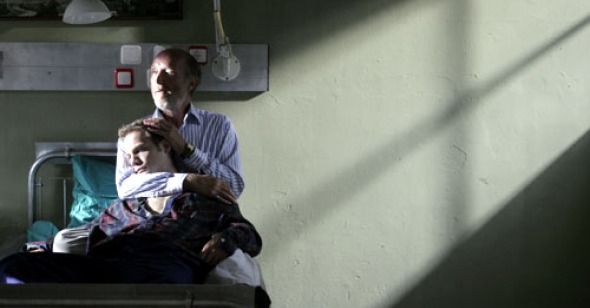Unforgiven
By Chris Wisniewski
Forgiveness
Dir. Udi Aloni, U.S./Israel, International Film Circuit
Udi Aloni's Forgiveness asserts its political ambitions early, with an opening title scroll that tells of a Palestinian village, whose inhabitants were slaughtered by an Israeli militia in 1948. On this site now rests a mental institution, the setting for much of Aloni's first fiction feature. Despite this portentous setup and the film’s heavy-duty title, Forgiveness never seems to deliver any sort of trenchant look at the history, legacy, or current state of the Israel-Palestine conflict. Maybe it's in there somewhere, between the enigmatic palm reader and the covert memory drug and the ghost with the key necklace and the blind prophet and the Palestinian-cleaning-woman-turned-terrorist. But even the most astute viewer will likely have difficulty discerning coherence, much less political meaning, from this convoluted mystery/war film/romance/musical/Oedipal drama. Midway through, two characters have an inane conversation in which they compare mental health treatment to building a bridge over a black hole, and one of them remarks on the impossibility of doing so, because a black hole simply absorbs everything around it—and they go on to explain, there’s no way out of or over a black hole. This silly mixed metaphor may provide an apt analogy for the film itself: lots of ideas go into Forgiveness, but none make it out the other end.
At the center of this muddle is David (Itay Tiran), a petulant twentysomething American-Israeli who begins the film in a catatonic state. Through flashbacks and flash-forwards, Aloni slowly traces David’s journey from New York to Israel to the mental institution and back. Along the way, David’s overwhelming resentment of his father (Michael Sarne) emerges as his singular psychological motivation. He enlists in the Israeli army, mostly out of spite, and eventually lands in the institution for reasons that remain somewhat obscured. It all has something to do with a dead Palestinian girl who may or may not be related to the aforementioned ghost, who in turn may or may not be related to the daughter (Tamara Mansour, who plays all three roles) of the Palestinian woman (Clara Khoury) David dates upon his return to New York, who happens to own a necklace that may or may not be the same necklace into which the palm reader placed a slip of paper onto which she’d written David’s fate. Still following? Reconstructing the film’s plot, however, is mostly a fool’s errand, as Forgiveness’s loftier aspirations to supernatural ambiguity, psychological complexity, and political comment obscure cause and effect beyond recognition.
The movie more or less succeeds on a purely technical level, with some decent HD photography and proficient, if overly busy, editing. The dance sequences are mounted with crisp energy, though they completely undermine the film’s seriousness of purpose. Less an abomination than a plain and simple mess, Forgiveness gets bogged down in abrupt narrative and tonal shifts that make for a maddeningly schizophrenic viewing experience.
All of this could be—ahem—forgiven, if David came across as likable, but his anger seems trifling in the political context in which his story is set. At one point, he spews vitriol at another soldier with aggressive masculine posturing (the word “faggot” just rolls off the tongue), complaining about how his father has jerked him between Israel and America like a yo-yo. Afterwards, David and the soldier go to a club and get high on ecstasy, some of which they slip into the cleaning woman’s drink (the same Palestinian who later becomes a terrorist). None of this behavior is remotely endearing, though it may be possible that this is Aloni’s point—that by relocating the story of a disillusioned, overprivileged straight male into a more complicated social and moral context, he means somehow to deconstruct it. That seems like a stretch, though, given the movie’s unwavering alignment with David’s point-of-view. By the time (spoiler alert) David finally blows his brains out, he has long overstayed his welcome. But then Forgiveness turns back on itself, and it just keeps going, without ever really getting anywhere.
